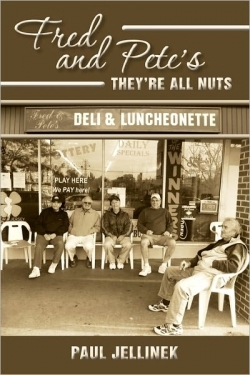Fred and Pete's
They're All Nuts
Fred and Pete’s: They’re All Nuts is a time capsule: a 1960s diner. Paul Jellinek cracks it open with a series of in-depth interviews, some touching vignettes, and his own comments that tie it all together into a cohesive sense of this community, this New Jersey microcosm. This small Mom and Pop business, like so many that have already disappeared from the landscape, is a meeting place where politics, local events, and global problems are solved over a steaming cup of coffee or a pastrami sandwich. Jellinek, whose first book is Promise to Mary, not only tells the stories of the owner, his customers, and his employees, but recreates the actual interviews in present time. The interviews act like a lens to narrow the focus and also tell Jellinek’s own story. It is a memoir, a sociological study, and an archaeological dig all presented in 251 pages of surprisingly detailed and entertaining prose.
Reminiscent of a whistle stop café, or as Kay, one of the waitresses says, “A corner bar without the booze,” the book begins with Jellinek’s interview with Tom Armenti, the current owner whose father was the Fred in Fred and Pete’s. He sheds light on what motivates a man to work from dawn to dark. “Getting up in the morning is no fun, and standing on your feet twelve hours is no fun. But the customers are good…ninety-five percent are good people.”
Some of those good people were political movers and shakers: governors, Supreme Court Judge Alito, the local school board members. And some are immigrants—like Israel, his short order cook from Guatemala and Gonzalo, his dishwasher from Mexico. But most of the stories come from the workers—men who built the roads, who retired from the local factories, and fought the wars. And the women who served the coffee and eggs and kept the news flowing. Armenti estimates that “three hundred girls must’ve worked here over the years.”
Fred and Pete’s is the place to find out what’s happening in the community. “Broke his leg or something. Theresa, who’s working the counter, says no, it was his pelvis…When I come back in around lunch-time for a pastrami sandwich, Tom is there and he says, no, it wasn’t a lawn-mower, it was a Weed-Wacker…” But it isn’t just gossip, it is family, and Tom adds: “If you see him, ask him if he wants me to bring him by some dinner tonight.”
Jellinek describes this as “a love story in the truest sense of the word.” He admits readers to an insider’s affectionate look at a community and individuals who frequent this establishment. It is an entertaining read, but it might benefit from more of a plot line, not just a series of character studies. And readers may notice that negative elements or anything embarrassing to those interviewed have been omitted. Those who enjoy Fannie Flagg’s novels will enjoy this nostalgic look at a New Jersey diner.
Reviewed by
Dawn Goldsmith
Disclosure: This article is not an endorsement, but a review. The publisher of this book provided free copies of the book and paid a small fee to have their book reviewed by a professional reviewer. Foreword Reviews and Clarion Reviews make no guarantee that the publisher will receive a positive review. Foreword Magazine, Inc. is disclosing this in accordance with the Federal Trade Commission’s 16 CFR, Part 255.

